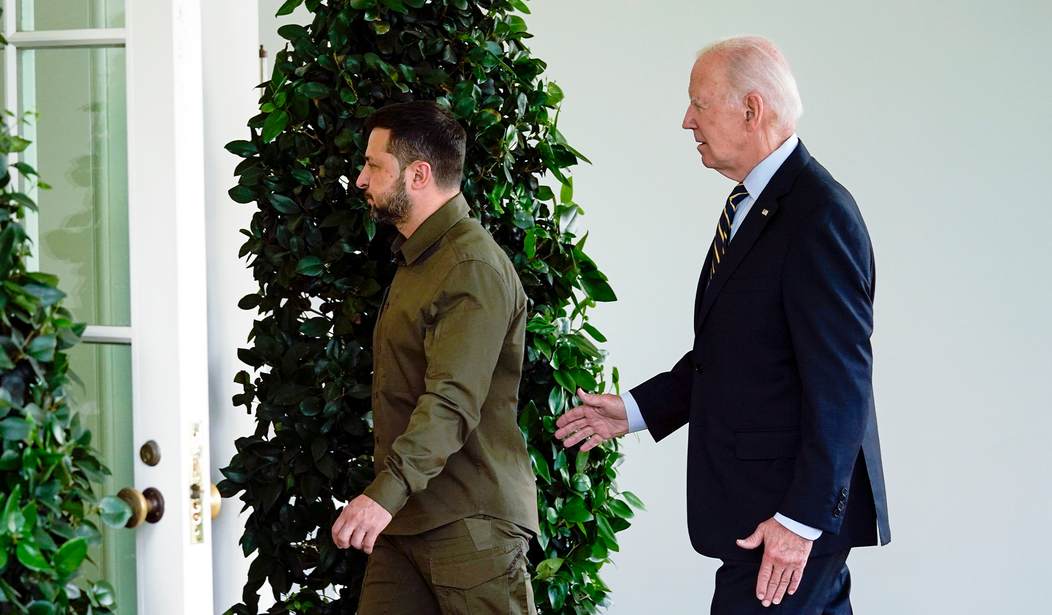The weapons are still flowing, but the inspiring words about defending democracy in Ukraine have been trailing off, and a new narrative about making a deal with Russia is starting to be rolled out.
Over the past few weeks, there has been a quiet admission that the Ukrainian counteroffensive was stalled and made little progress at enormous cost, and now there is actual talk about finding a way to wind down the hostilities.
Russia has withstood efforts to reverse its invasion of Ukraine. Now the U.S. and its allies must shift to a new strategy of containment, write Eugene Rumer and Andrew S. Weiss. https://t.co/KvN7MJNm4Y https://t.co/KvN7MJNm4Y
— The Wall Street Journal (@WSJ) November 16, 2023
Magical thinking is, of course, what many people have been engaged in when it comes to Ukraine.
I have always thought that Ukraine is the aggrieved party in this conflict, and I also have believed that Russian military might was overstated, as the initial phase of the war demonstrated. When faced with a determined and well-equipped opponent its military is less capable than it appears, at least when it is on the offense.
As a defensive force, though, Russia is formidable, at least partly because its leaders have always been willing to use its citizens as cannon fodder. Quantity has a quality all its own.
Ukraine’s defense has been expensive in lives and treasure, and it seems pretty obvious that recapturing more territory is going to cost more of both, and the desired outcome is unlikely to happen soon, if ever.
Putin has reason to believe that time is on his side. At the front line, there are no indications that Russia is losing what has become a war of attrition. The Russian economy has been buffeted, but it is not in tatters. Putin’s hold on power was, paradoxically, strengthened following Yevgeny Prigozhin’s failed rebellion in June. Popular support for the war remains solid, and elite backing for Putin has not fractured.
Western officials’ promises of reinvigorating their own defense industries have collided with bureaucratic and supply-chain bottlenecks. Meanwhile, sanctions and export controls have impeded Putin’s war effort far less than expected. Russian defense factories are ramping up their output, and Soviet legacy factories are outperforming Western factories when it comes to much-needed items like artillery shells.
Western military equipment is more technologically advanced than Russian, but that has turned out to be a double-edged sword. It is also more expensive and much more time-consuming to replace. While the West has not yet reached the bottom of the barrel, we can see the bottom from here. As the Israel-Hamas war has shown, there aren’t enough reserves to leave us in a comfortable position.
And it’s not like we can just ramp up production because, well, technologically-rich weapons aren’t just stamped out as they were in the mid-20th century. It takes time and money.
Ukraine has taken back more than half of its territory seized by Russia’s forces since February 2022. In this tough and dynamic battle, Ukraine’s soldiers are fighting bravely every single day, and they continue to inspire the world with their bravery and courage. We will… pic.twitter.com/ELeU4EbVfK
— U.S. Mission to NATO (@USNATO) November 20, 2023
NATO and its leaders are smoothing the path for a graceful drawdown of their support for Ukraine, both because it has never been as strategically important as presented, and because putting a lot more effort into pushing Russia back is a fool’s errand. Not to mention the fact that Ukraine, which has always been corrupt, is becoming less democratic as always happens during wartime. The optics of supporting a regime that won’t be holding elections during the conflict–a regime promoted as a democracy–seems a bit off-message.
Some people have portrayed the West or Ukraine as the bad guys, but that is a big stretch. You can’t deny the simple fact that Putin invaded and tried to install a puppet regime. However imperfect Ukraine is compared to our standards, Russia is much worse and the aggressor. My argument with the level of our support is simply this: China is a much more significant threat to US interests than Russia ever was, and certainly that is the case now as their military has been cut down to a much smaller and weaker size. They present zero threat to NATO using conventional weapons, and Putin has proven he won’t use nukes (thank God!).
The Middle East and Taiwan are far more strategically significant than Ukraine, which has never been an ally, If Poland were at risk or invaded the US would have to be involved indefinitely; Ukraine not so much.
NATO sure seems to be thinking in these terms.
Russia will likely be a strategic competitor, even adversary, to the US and NATO for the foreseeable future. But unlike Soviet times, it will never again be a genuine strategic threat to our existence or dominance. China, for now, plays that role–at least as much for its infiltration of our domestic politics, academia, and our public schools. Russia is a bear in more ways than one–it is not only lumbering but also lacks subtlety. We can counter it much more easily than China.
These facts don’t demand we abandon Ukraine, but they do mean we should wind down our support for Ukraine’s maximalist goals. They probably don’t make sense for Ukraine, and certainly don’t for the West.








Join the conversation as a VIP Member